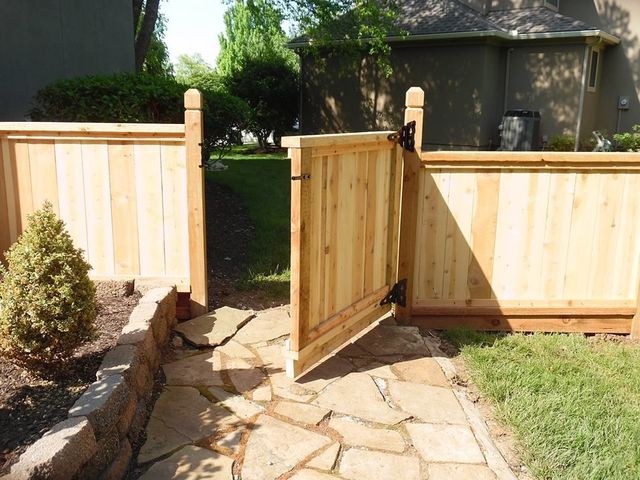All Categories
Featured
If you're considering installing a fence around your residential or commercial property, understanding the permit requirements in your area is crucial. In this guide, we'll damage down the different permits you may need to install a fence and exactly how to ensure your project remains certified with regional legislations.
Why Are Permits Essential for Fencing Setup? Permits are called for to make sure that the fence you construct stick to neighborhood building ordinance, zoning guidelines, and security standards. These authorizations are in location to shield your property, the buildings around you, and the atmosphere. They make certain that the fencing will not block energies, traffic circulation, or create risks for pedestrians. In addition, they aid maintain the visual and architectural stability of your area.
![]()
Sorts Of Permits You May Need. Structure Permit. A building permit is one of the most usual need for setting up a fence. This license makes certain that the structure you build abide by local safety and security codes and regulations. If your fencing surpasses a specific elevation (normally around 6 feet), you may require to get a structure permit. The neighborhood authorities will typically review your strategies to guarantee that your fencing is structurally audio and safe.
Zoning Authorization. A zoning permit guarantees that your fencing conforms with these guidelines. Your fence could require to be established back a certain range from pathways or property lines.
Homeowners Organization (HOA) Authorization. If your property is part of a home owners organization, you might need authorization prior to installing a fence. HOAs typically have rigorous policies relating to the kind, style, and materials used for fencings to keep a consistent appearance throughout the area.
Specialized Permits. In many cases, you might need specialized allows based upon the area of your residential or commercial property or the nature of your fencing. If your property is in a flood zone, you might need extra licenses to guarantee that your fence does not obstruct water drainage or water flow. In a similar way, if you intend to build a fencing near an environmentally secured area, you might require a special authorization to conform with ecological regulations.
![]()
Utility Easements and Energy Company Approvals. Before installing a fence, you must check if your property has an easement. Developing a fencing within an easement could interfere with utility maintenance or damages underground lines.
Exactly How to Establish Which Allows You Required. Talk To Neighborhood Authorities. The initial step in establishing the permits needed is to call your regional building department or zoning workplace. They can provide particular details about what permits are necessary for your area. Lots of cities have on the internet sources or sites where you can examine the requirements or even get an authorization online.
Get In Touch With a Specialist Fencing Contractor. A local fencing contractor is typically aware of the license process and regional regulations. They can assist you navigate the demands and guarantee that your task is certified. Lots of contractors likewise deal with the permit application procedure in your place, saving you time and initiative.
Evaluation Your Neighborhood's HOA Guidelines. Make sure to evaluate their standards prior to applying for any authorizations if you live in an area regulated by an HOA. The HOA might call for specific styles, products, or elevation restrictions for fencings within the community. Submit your strategies to them for authorization before continuing.
![]()
Repercussions of Not Getting a License. Setting up a fencing without the required licenses can lead to severe repercussions. Possible customers might hesitate to buy a property with an unpermitted fence, particularly if it's in infraction of zoning laws.
Conclusion. Prior to installing a fence on your residential property, make certain you recognize the local guidelines and get any necessary authorizations. Structure permits, zoning permits, HOA authorizations, and specialty allows all play an important function in ensuring that your fencing is risk-free, lawful, and compliant.
Why Are Permits Essential for Fencing Setup? Permits are called for to make sure that the fence you construct stick to neighborhood building ordinance, zoning guidelines, and security standards. These authorizations are in location to shield your property, the buildings around you, and the atmosphere. They make certain that the fencing will not block energies, traffic circulation, or create risks for pedestrians. In addition, they aid maintain the visual and architectural stability of your area.

Sorts Of Permits You May Need. Structure Permit. A building permit is one of the most usual need for setting up a fence. This license makes certain that the structure you build abide by local safety and security codes and regulations. If your fencing surpasses a specific elevation (normally around 6 feet), you may require to get a structure permit. The neighborhood authorities will typically review your strategies to guarantee that your fencing is structurally audio and safe.
Zoning Authorization. A zoning permit guarantees that your fencing conforms with these guidelines. Your fence could require to be established back a certain range from pathways or property lines.
Homeowners Organization (HOA) Authorization. If your property is part of a home owners organization, you might need authorization prior to installing a fence. HOAs typically have rigorous policies relating to the kind, style, and materials used for fencings to keep a consistent appearance throughout the area.
Specialized Permits. In many cases, you might need specialized allows based upon the area of your residential or commercial property or the nature of your fencing. If your property is in a flood zone, you might need extra licenses to guarantee that your fence does not obstruct water drainage or water flow. In a similar way, if you intend to build a fencing near an environmentally secured area, you might require a special authorization to conform with ecological regulations.

Utility Easements and Energy Company Approvals. Before installing a fence, you must check if your property has an easement. Developing a fencing within an easement could interfere with utility maintenance or damages underground lines.
Exactly How to Establish Which Allows You Required. Talk To Neighborhood Authorities. The initial step in establishing the permits needed is to call your regional building department or zoning workplace. They can provide particular details about what permits are necessary for your area. Lots of cities have on the internet sources or sites where you can examine the requirements or even get an authorization online.
Get In Touch With a Specialist Fencing Contractor. A local fencing contractor is typically aware of the license process and regional regulations. They can assist you navigate the demands and guarantee that your task is certified. Lots of contractors likewise deal with the permit application procedure in your place, saving you time and initiative.
Evaluation Your Neighborhood's HOA Guidelines. Make sure to evaluate their standards prior to applying for any authorizations if you live in an area regulated by an HOA. The HOA might call for specific styles, products, or elevation restrictions for fencings within the community. Submit your strategies to them for authorization before continuing.

Repercussions of Not Getting a License. Setting up a fencing without the required licenses can lead to severe repercussions. Possible customers might hesitate to buy a property with an unpermitted fence, particularly if it's in infraction of zoning laws.
Conclusion. Prior to installing a fence on your residential property, make certain you recognize the local guidelines and get any necessary authorizations. Structure permits, zoning permits, HOA authorizations, and specialty allows all play an important function in ensuring that your fencing is risk-free, lawful, and compliant.
Latest Posts
Reasons Consistent Vehicle Maintenance at Montclare Auto Repair Saves You Money
Published May 28, 25
1 min read
Explore Montclare Auto Repair’s Most Popular Car Care Solutions and Why Drivers Choose Them
Published May 24, 25
1 min read
Uncover the Greatest Auto Repair Coupons in Montclare, Chicago
Published May 23, 25
1 min read
More
Latest Posts
Reasons Consistent Vehicle Maintenance at Montclare Auto Repair Saves You Money
Published May 28, 25
1 min read
Explore Montclare Auto Repair’s Most Popular Car Care Solutions and Why Drivers Choose Them
Published May 24, 25
1 min read
Uncover the Greatest Auto Repair Coupons in Montclare, Chicago
Published May 23, 25
1 min read